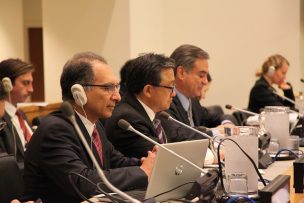
Second Committee: more at risk of being left behind if SDG progress does not accelerate
Economic growth and economic development was on the agenda, as the UN General Assembly*s Second Committee opened its substantive session on 8 October. Chaired by Ambassador Jorge Skinner-Klee Arenales of Guatemala, the upcoming session will be dealing with a variety of issues including financing for development, sustainable development, eradication of poverty, agricultural development, food security, and information and communication technologies.
UN DESA*s Under-Secretary-General Liu Zhenmin opened the session, by applauding the ※continuing strong momentum§ for implementing the SDGs, evidenced by the number of countries volunteering to conduct national reviews at the High-Level Political Forum. However, despite these positive indicators, Mr. Liu stressed that progress is too slow and asked the Committee to reflect on ways to accelerate progress through the discussion of policy issues on the agenda.
Mr. Liu also highlighted the importance of a strong international economy with positive consumer confidence and investment behavior. He warned of economic risks that can decelerate progress further and impede sustainable development. Uncertainty in global trade, financial vulnerabilities in developing countries and geopolitical tensions are all significant risks. He asserted that success will only be met by bolstering ※the resilience of economies and societies while improving the lives of the people who are most vulnerable.§
 Mr. Liu also cited discouraging trends that show that global hunger has been on the rise, the decline in poverty rates has slowed and that the number of conflicts rose again.
Mr. Liu also cited discouraging trends that show that global hunger has been on the rise, the decline in poverty rates has slowed and that the number of conflicts rose again.
※These issues, just like the 2030 Agenda itself, are interlinked. Poverty can be associated with an increased likelihood of conflict, while instability, violence and conflict impede sustainable development. The solutions are also interlinked. The effective way to prevent societies from descending into crisis 每 including but not limited to conflicts 每 is to strengthen their resilience through investments in inclusive and sustainable development,§ said Mr. Liu.
Homi Kharas, Interim Vice-President at the Brookings Institution, followed Mr. Liu*s speech by presenting a research project his organization has completed on ※Counting who gets left behind.§ The project focused on which issues are making the least and most progress and which countries face the most severe challenges. He analyzed a total of 21 targets that could be quantified and measured.
Mr. Kharas identified a variety of informative trends and made note of specific goals the international community is far from achieving. These included reducing lives lost to non-communicable diseases by one third, reducing child mortality, reducing air pollution, improving gender equality and ensuring access to sanitation.
Mr. Kharas also researched trends on a country-by-country level. He determined that there is a lack of progress in countries with large populations, like China, but also in large advanced economies like the United States, where little has been achieved in the areas of obese children and gender equality.
According to Mr. Kharas, the poorest countries remain the furthest behind, partly because their starting points are lower than richer countries. He supported Mr. Liu*s statement by concluding that progress is being made in every country, but targets require faster advancement if the goal is to leave no one behind.

Follow Us